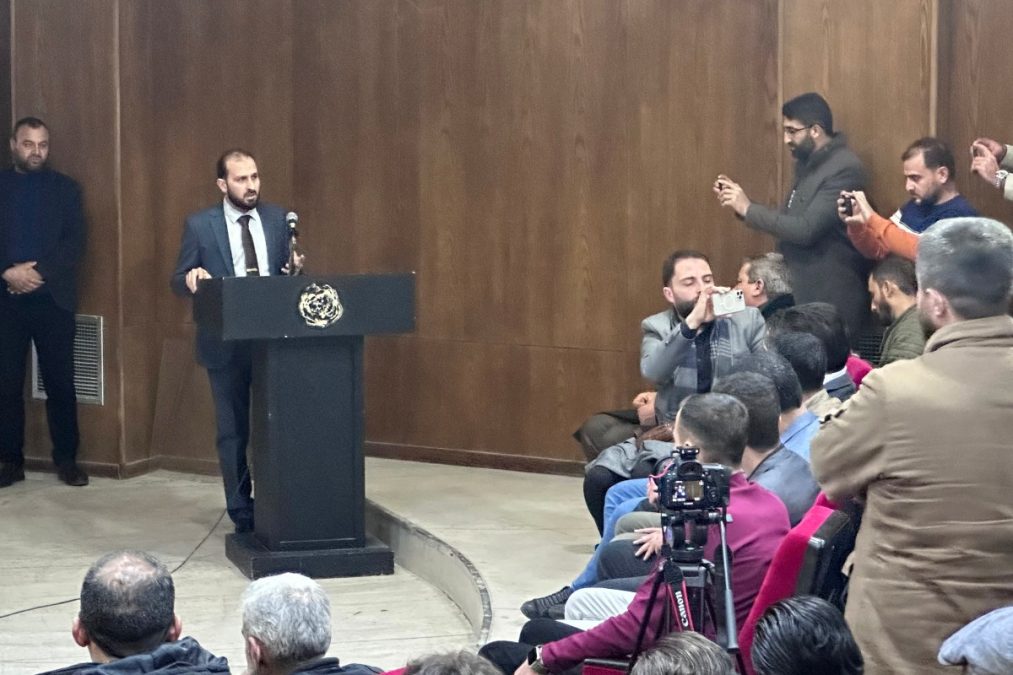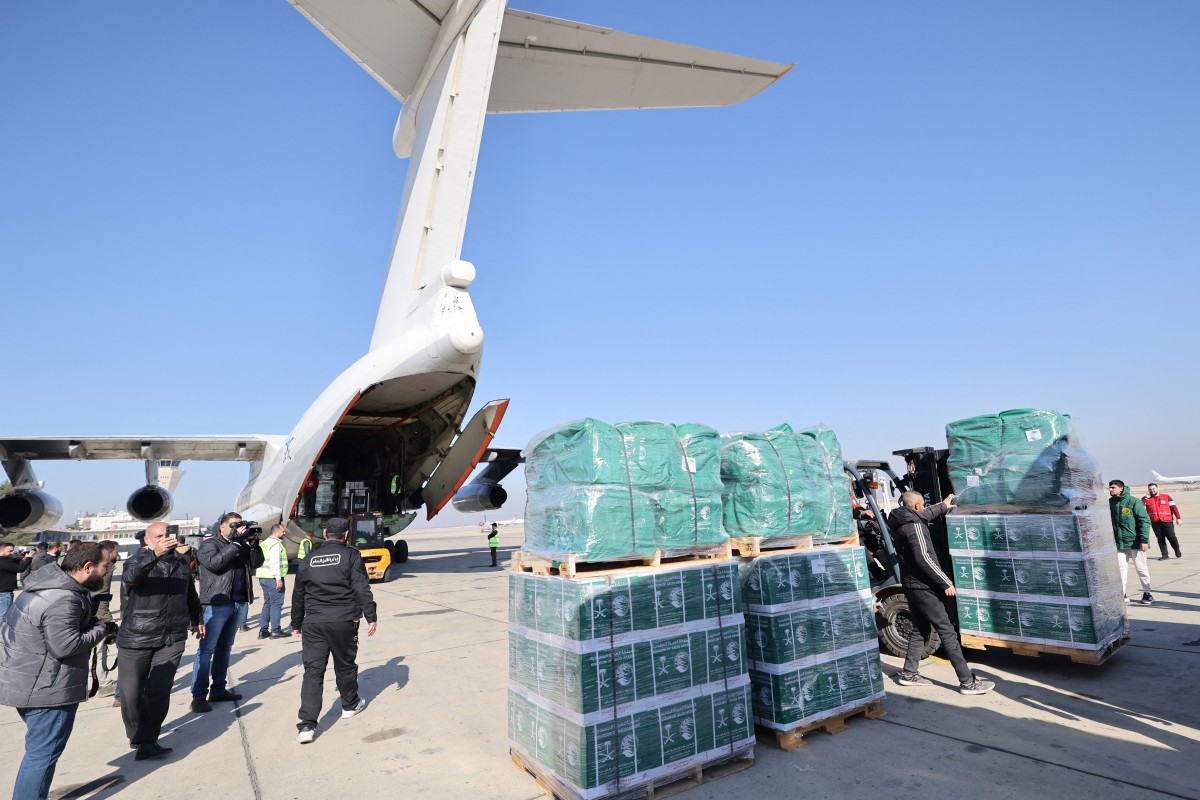Damascus, Syria – Syria’s top diplomat said he hoped to open a “new, bright page” with Saudi Arabia upon arriving in the kingdom Wednesday, the first foreign visit for Syria’s new rulers, who seized power last month.
“I have just arrived in the sisterly Kingdom of Saudi Arabia, accompanied by the Minister of Defence Murhaf Abu Qasra and the Head of the General Intelligence Service Anas Khattab,” Assaad al-Shibani said in a statement on X.
“Through this first visit in the history of Free Syria, we aspire to open a new, bright page in Syrian-Saudi relations that befits the long shared history between the two countries,” he added.
Earlier Wednesday Syrian state media said the top delegation had come to the kingdom “at the invitation of the Saudi foreign minister”, quoting a foreign ministry source.
A statement shared by Syria’s Foreign ministry said Saudi Arabia’s Vice Minister of Foreign Affairs Waleed bin Abdulkarim El-Khereiji had received the delegation at the international airport in Riyadh.
The statement was accompanied by photos of him and Shibani shaking hands and other pictures of Saudi officials sitting down with the delegation.
Last month, a Saudi delegation met Syria’s new leader Ahmed al-Sharaa in Damascus, a source close to the Saudi government told AFP at the time.
Sharaa heads the Islamist Hayat Tahrir al-Sham group that led the rebel offensive that ousted President Bashar al-Assad on December 8.
Last week, in an interview with Saudi-owned Al Arabiya television, Sharaa said Saudi Arabia “will certainly have a large role in Syria’s future”, pointing to “a big investment opportunity for all neighbouring countries”.
Syria’s economy and infrastructure has been devastated by more than 13 years of civil war that began with a brutal crackdown on pro-democracy protests in 2011.
Saudi Arabia severed ties with Assad’s government in 2012 and backed Syrian rebels seeking to overthrow him early in the country’s civil war.
But last year, Riyadh restored ties with Assad’s government and was instrumental in Syria’s return to the Arab League, ending its regional isolation.
Saudi Arabia has become a major market for captagon, an addictive drug for which there is huge demand in the oil-rich Gulf.
The amphetamine-like narcotic was Syria’s most valuable export under Assad, turning the country into one of the world’s leading narco states.
Free press promise
Syria’s minister of information in the country’s transitional government told AFP he is working towards a free press and committed to “freedom of expression”, after decades of tight control under the country’s former rulers.
“We are working to consolidate freedoms of the press and expression that were severely restricted” in areas controlled by the former government of Bashar al-Assad, said the minister, Mohamed al-Omar, after Islamist-led rebels on December 8 ended more than five decades of rule by the Assad clan.

Syria’s ruling Baath party and the Assad family dynasty heavily curtailed all aspects of daily life, including freedom of the press and expression with the media a tool of those in power.
Reporters Without Borders, a freedom of information watchdog, ranked Syria second-last on its 2024 World Press Freedom Index, ahead only of Eritrea and behind Taliban-ruled Afghanistan.
“There was a heavy restriction on freedom of the press and expression under the regime which practised censorship. In the period to come we are working on the reconstruction of a media landscape that is free, objective and professional,” Omar said during an interview with AFP on Tuesday.
He is part of the interim administration installed in Damascus by the victorious rebel coalition led by Hayat Tahrir al-Sham.
The group has its origins in the Syrian branch of the jihadist group Al-Qaeda and is designated a terrorist organisation by numerous governments, but has sought to soften its image in recent years.
Diplomats from around the region and from the West have made contact with Syria’s new rulers, who have also vowed to protect the country’s religious and ethnic minorities.
Omar was previously minister of information in the self-proclaimed Salvation Government, the civil administration set up in 2017 by HTS in the rebel holdout of Idlib province, in Syria’s northwest. It was from Idlib that the rebels began their lightning advance towards Damascus, 13 years into the country’s civil war.
After the conflict erupted in 2011 with the government’s brutal repression of pro-democracy protests, Assad tightened restrictions on independent journalism.
A different way
“We don’t want to continue in the same way, that is, have an official media whose aim is to polish the image of the ruling power,” Omar said.
Following Assad’s overthrow and flight to Moscow, Syrian media outlets which had trumpeted his regime’s glories quickly adopted a revolutionary fervour.
Omar said the new administration wants to “reduce bureaucracy and facilitate the work of foreign press teams” who were intensely scrutinised by Assad’s government and had difficulty obtaining visas to work freely.
On December 13, the Information Ministry released a statement saying “media workers who were part of the war and propaganda machine of the fallen Assad regime and contributed directly or indirectly to promoting its crimes,” would be “held to account”.
But Bassam Safar, head of the Damascus branch of the anti-Assad Syrian journalists’ union, previously based abroad, said earlier that no media worker should be held responsible “unless it is proven that they took part in the bloodshed.”
That, he said, “is the business of the courts.”
Saffar said the Syrian people should reconcile with their journalists, to establish “a new media environment built on freedom” and human rights.
On Tuesday Omar held an exchange with dozens of Syrian journalists to discuss the transition.
“We want media reflecting Syrian cultures in their diversity, reflecting their ambitions, and that transmit their preoccupations and serve as a link between the people and the administration”, Omar told AFP.
Saudi humanitarian air bridge to Syria
Saudi Arabia on Wednesday launched a humanitarian air bridge to Syria, delivering food, shelter and medical supplies, the official Saudi Press Agency reported.
The air bridge, established by the King Salman Humanitarian Aid and Relief Centre (KSrelief), aims to “alleviate the effects of the difficult conditions currently facing the Syrian people”, SPA said.
Others, including the European Union and Ukraine, have also announced aid for Syria, where the United Nations said seven out of 10 people need support.
Riyadh’s air bridge will “be followed by another land bridge in the coming days,” said Abdullah al-Rabeeah, the head of KSrelief, SPA reported.
Syria has been devastated by 13 years of civil war as well as Western sanctions targeting the government of deposed president Bashar al-Assad.
Millions have been displaced while the economy and civil infrastructure are in tatters, with a World Health Organisation analyst saying last week that approximately half of the country’s hospitals are out of service.
A source close to the Saudi government earlier said a high-ranking Saudi delegation had visited Damascus and met Syria’s new leader, Ahmed al-Sharaa, whose Islamist group Hayat Tahrir al-Sham led the overthrow of Assad on December 8, after a lightning offensive.
Riyadh previously sent aid to Syria after a devastating February 2023 earthquake.








